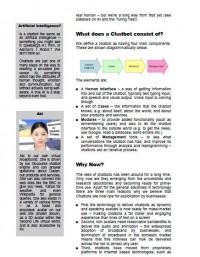A new white paper on deploying chatbots has been released by virtual worlds and chatbot solutions provider Daden Limited. The white paper aims to help organisations and businesses understand what chatbots are, how they are being used to win more customers, grow revenues, improve customer satisfaction and reduce cost. Chatbots are known by a wide variety of terms including virtual assistants and virtual agents. Some are quite sophisticated whilst others offer no more than a simple site guide and although the concept of chatbots have been around since the 1950’s it is only in the last five years or so that early adopters, such as Ikea, have been using them. They are however growing in popularity and the E Commerce Times reported in June that “approximately 10% of the Fortune 1,000 already have them”. Daden have over a decades worth of experience of working with chatbot technology and speech systems. “We have seen an increasing interest in chatbots and chatbot technology over the last three years - so much so we felt the time was right to issue a white paper to help demystify the subject and explain the different types of chatbots.” said Daden’s Managing Director David Burden. The white paper aims to help organisations and businesses understand what chatbots are, how they are being used to win more customers, grow revenues, improve customer satisfaction and reduce cost.
The white paper aims to help organisations and businesses understand what chatbots are, how they are being used to win more customers, grow revenues, improve customer satisfaction and reduce cost.
Chatbots can be used for a myriad of reasons from providing a website or FAQ guide to acting as an e-learning tutor or even an “agony aunt”. Deploying a chatbot on a website can provide a “human” interface. They have a potential both within commercial organisations and in the public sector to provide a “face” into a faceless organisation’s website. Some chatbots are very sophisticated and answer in natural language whilst others are primitive in their responses - all can help to increase brand awareness, customer service, sales and profit and reduce costs. Daden’s white paper explains the different types of chatbot and why the time is now right for businesses to consider them.
A 2009 Forrester report stated “Virtual agents offer compelling business benefits, including enhancing customer experiences, reducing live help costs, and driving cross-sells.”
Daden’s client director Soulla Stylianou adds “Daden often get invited into businesses to help them understand how such emerging technologies can make a difference. The popularity of Daden’s recent series of seminars on virtual world and chatbot technologies confirmed that more organisations are considering 21st century technologies to raise an organisation’s profile and improve their bottom line.”
John Dowd, Hybrid Services Manager within the Learning and Information Services department at the University of Wolverhampton conducted a survey of their library chatbot LISA which was built on Daden’s Discourse chatbot engine and reported the findings at Daden’s emerging technology seminars. Of those who participated in the initial survey during the launch of LISA on their website 85% found the chatbot helpful, 80% said they enjoyed using the chatbot and of those using the library’s chat service 100% said they would use the chatbot first to see if it could answer their query. Comments included “It’s much more user-friendly way of finding information on the website than search engines” and “think its a really good idea because it takes you to pages on the internet you might never have come across or been aware of.” Since the pilot and survey results, LISA has been improved further and is now providing help and support 24/7 on the University of Wolverhampton library’s web pages.
Daden’s white paper can be downloaded from Daden’s website at http://www.daden.co.uk/tools/download_files.html
http://www.daden.co.uk/press_releases/daden_releases_white_paper_on.html


